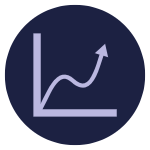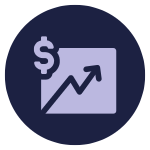- The stock index is an indicator of the change in prices of a certain group of securities
- You can think of a stock index as a “basket” of stocks, grouped according to some criterion
- The most important thing when studying an index is what stocks or bonds it is formed from
- The main purpose of compiling a stock index is to create an indicator by which investors could characterize the general direction
Stock Indices Explained - A Collection Of Stocks
Indices definition: The stock index is an indicator of the state and dynamics of the securities market. The stock index is an indicator of the change in prices of a certain group of securities. It can be thought of as a “basket” of securities, grouped according to a certain criterion. The stock index is used to get a general picture of the state of the stock/bond market of the industry, country, or private investment portfolio. The set of stocks/bonds, on the basis of which the index is calculated, allows you to determine what information can be obtained by observing its dynamics.
Many stock indices, some of which were created to solve specific problems, are classified according to different criteria. The first stock index appeared in 1884. It was created by the American financial journalist Charles Doe. The index, known today as the Dow Jones Industrial Average, was calculated based on the quotes of the 11 largest transport companies in America at that time. Until 1896, it was called the Dow Jones Transportation Average.
Another well-known index, the S&P, was created by Standard & Poor's in March 1957. It included 425 industrial, 15 railway, and 60 energy companies. The S&P 500 is made up of 500 of the largest publicly traded US corporations, which form about 80% of the total capitalization of the American stock market.
Accordingly, stock indices can be "agency", when they are calculated by special agencies (for example, the Standard & Poor’s agency's family of indices) or exchange, created, in fact, stock exchanges.
The stock index is an indicator of the change in prices of a certain group of securities. It can be thought of as a “basket” of securities, grouped according to a certain criterion. The stock index is used to get a general picture of the state of the stock/bond market of the industry, country, or private investment portfolio. The set of stocks/bonds, on the basis of which the index is calculated, allows you to determine what information can be obtained by observing its dynamics.
Many stock indices, some of which were created to solve specific problems, are classified according to different criteria. The first stock index appeared in 1884. It was created by the American financial journalist Charles Doe. The index, known today as the Dow Jones Industrial Average, was calculated based on the quotes of the 11 largest transport companies in America at that time. Until 1896, it was called the Dow Jones Transportation Average.
Another well-known index, the S&P, was created by Standard & Poor's in March 1957. It included 425 industrial, 15 railway, and 60 energy companies. The S&P 500 is made up of 500 of the largest publicly traded US corporations, which form about 80% of the total capitalization of the American stock market.
Accordingly, stock indices can be "agency", when they are calculated by special agencies (for example, the Standard & Poor’s agency's family of indices) or exchange, created, in fact, stock exchanges.
Indices vs Stocks
 Indices trading and stocks trading are 2 completely different things. When we talk about the former it is a basket of stocks that make up the index, while stock trading refers to the trading of stocks of particular companies. It is up to a trader whether he or she wants to continue trading with one of these assets in the long term. However, experience is pivotal to become successful in trading.
When you are trading indices, you do not need a stock brokerage company. Buying or selling indices is possible through an Internet platform. Trading indices is usually more rewarding as well and another great advantage that they hold is the fact that they require a minimum amount of research, compared to checking all companies individually.
Indices trading and stocks trading are 2 completely different things. When we talk about the former it is a basket of stocks that make up the index, while stock trading refers to the trading of stocks of particular companies. It is up to a trader whether he or she wants to continue trading with one of these assets in the long term. However, experience is pivotal to become successful in trading.
When you are trading indices, you do not need a stock brokerage company. Buying or selling indices is possible through an Internet platform. Trading indices is usually more rewarding as well and another great advantage that they hold is the fact that they require a minimum amount of research, compared to checking all companies individually.
Indices As An Indicator For Stocks
 Indices can be used to describe the market situation. Usually, the S&P 500 Index is used to evaluate the US economy alongside the DOW. If either of these indices is in the red, it means that the whole US economy is struggling. If it’s in the green then all is well. So, when people want to invest in stocks and see these indices in the red, they hold on for a while expecting a crash.
Any concept on the stock exchange has a specific purpose. The purpose of a stock indicator is to help investors draw conclusions about the direction and movement of stock quotes for a particular group of companies or sectors.
The process of studying the movement of a stock index significantly increases the understanding of the impact on the valuation of various events on the stock exchange. Fluctuations in the growth of oil prices will undoubtedly affect the growth of the assessment of absolutely all oil companies. The index will be able to help understand the general position and movement of a segment of the stock market by comparing stock prices. After all, different companies and their shares are growing, falling in price, or even standing in one place, without stock exchange fluctuations.
By comparing indices, you can capture the trading process of different segments of the economy relative to each other.
Indices can be used to describe the market situation. Usually, the S&P 500 Index is used to evaluate the US economy alongside the DOW. If either of these indices is in the red, it means that the whole US economy is struggling. If it’s in the green then all is well. So, when people want to invest in stocks and see these indices in the red, they hold on for a while expecting a crash.
Any concept on the stock exchange has a specific purpose. The purpose of a stock indicator is to help investors draw conclusions about the direction and movement of stock quotes for a particular group of companies or sectors.
The process of studying the movement of a stock index significantly increases the understanding of the impact on the valuation of various events on the stock exchange. Fluctuations in the growth of oil prices will undoubtedly affect the growth of the assessment of absolutely all oil companies. The index will be able to help understand the general position and movement of a segment of the stock market by comparing stock prices. After all, different companies and their shares are growing, falling in price, or even standing in one place, without stock exchange fluctuations.
By comparing indices, you can capture the trading process of different segments of the economy relative to each other.
What Did We Learn From This Indices Guide?
Typically, indices are made up of stock exchanges, investment banks, and other financial institutions. The stock index shows how the price of shares of companies operating in the same industry or country changes. The index does not necessarily include all companies in an industry or region — sometimes only the largest. Some exchange-traded funds (ETFs) copy stock indices.Common Questions On Index Trading
What Is A Market Index And What Does It Indicate?
Numbers are weighted estimates of the components that make up the index. The stock market index, for example, is weighted according to the prices and number of shares held by shareholders of various issues. The Standard & Poor's 500 stock index is one of the more popular indices, but many other indexes also track the stocks of various industrial groups.What Does The Stock Market Index Indicate?
When determining the investment attractiveness of markets, for example, of different countries, not only the growth rates of quotations are assessed, but also the fundamental prerequisites for this. A stock index is often compared to a thermometer that figuratively measures the temperature of the market. Stock market index functions:- Operational information about the situation in the market or its individual segments;
- The basic instrument for derivatives (options, futures, and forwards);
- The benchmark for evaluating the effectiveness of investments;
- A specialized tool that helps investors build their own stock market indicators;
- It replaces the market portfolio, which is important in portfolio theory and capital market models.
What Is A Stock Index Example?
- S&P 500 - responsible for the US market. The basket includes 500 companies listed on the NYSE and NASDAQ. The basket covers 75% of the capitalization of the entire American market.
- DJIA is the oldest index, calculated on 30 American blue chips.
- NASDAQ Composite - calculated based on the quotes of all stocks traded on the NASDAQ exchange.
- The Wilshire 5000 - calculated based on stock quotes of companies headquartered in the United States. Like the S&P 500, it characterizes the American market as a whole, but it is less popular than the S&P
- The VIX Fear or Volatility Index. With a stable rise in the S&P 500, VIX quotes fall, with a fall in the S&P 500, they rise.


 Amazon
Amazon